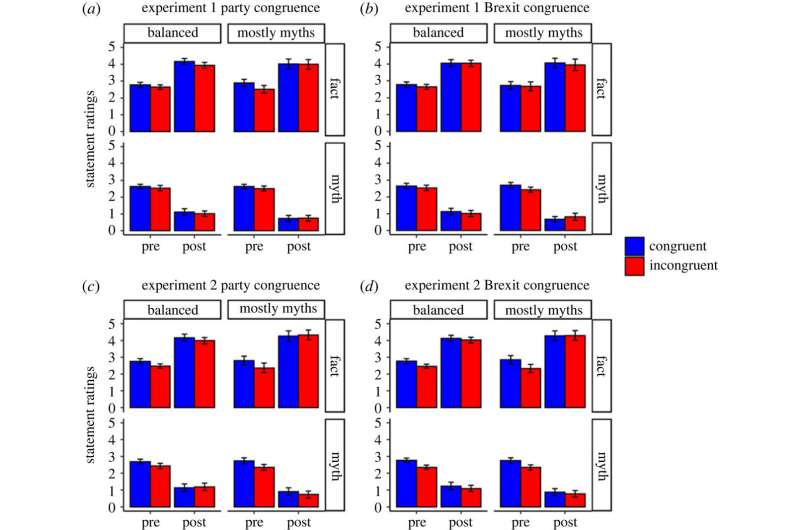When processing misinformation, British voters are divided more along party lines than over Brexit: Study

A new study has shown voters are more concerned about which party a politician belongs to than their position on Brexit—and this holds more sway with their future voting intentions when they encounter misinformation.
The research, led by the University of Bristol and University of Western Australia, explored how people’s views and attitudes were influenced by fact-checks of political misinformation, and whether this differed depending on whether the misinformation supported their party and also if they shared the same stance on a big issue, namely Brexit.
The participants were an adult sample of the UK population, and the politicians were chosen to balance both party (Tory vs. Labor) and Brexit position (Remainer vs. Leaver in each party).
The findings showed that overall, people were receptive to information they received about politicians’ statements. They believed accurate statements more after being told they were true, and they reduced belief in false statements after being told they were false. This occurred regardless of whether people shared the politicians’ party or their Brexit position. People also were less likely to vote for politicians who made multiple false statements, especially when they were from their preferred party.
When asked about their voting intentions, people unsurprisingly favored candidates from their preferred party, irrespective of the candidate’s position on Brexit. However, by contrast, the alignment between politicians’ and voters’ position on Brexit mattered considerably less, suggesting that polarization is greater along party lines than across the Brexit divide.
Robert Reason, co-lead author who is studying for a Master’s in Psychology at the University of Bristol, said, “Whilst polarization was found to be more apparent along party lines, our findings demonstrate that participants could still update their beliefs when presented with correcting information and they were not simply overwhelmed by their own motivated reasoning.”
The results indicate that despite the divisive and often toxic rhetoric surrounding the Brexit decision, the British public has not embraced this new dividing line as much as traditional party affiliation. The international team of researchers remarked that Partisan divides may be stronger because they are generally longer-standing and also encompass views on a wide variety of political topics, such as jobs, education, income inequality, and the way the political system works.
Fellow co-lead author, Toby Prike, from the University of Western Australia, said, “These results affirm the effectiveness of fact-checks for correcting political misinformation. Additionally, politicians were punished for spreading misinformation, with participants judging them as less accurate, and also having reduced voting intentions and more negative attitudes towards them.”
The findings are published in the journal Royal Society Open Science.
More information:
Toby Prike et al, Would I lie to you? Party affiliation is more important than Brexit in processing political misinformation, Royal Society Open Science (2023). DOI: 10.1098/rsos.220508
Citation:
When processing misinformation, British voters are divided more along party lines than over Brexit: Study (2023, February 2)
retrieved 3 February 2023
from https://phys.org/news/2023-02-misinformation-british-voters-party-lines.html
This document is subject to copyright. Apart from any fair dealing for the purpose of private study or research, no
part may be reproduced without the written permission. The content is provided for information purposes only.
For all the latest Science News Click Here
For the latest news and updates, follow us on Google News.

